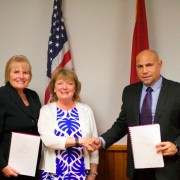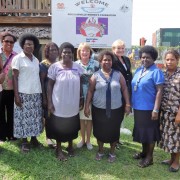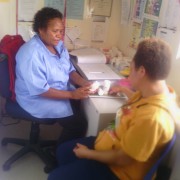The U.S. Government, through the U.S. Agency for International Development (USAID), launched a new project that will reduce the vulnerabilities of communities in Micronesia to impacts of climate change. Through its Pacific-American Climate Fund (PACAM), USAID awarded a total of US$244,315 grant to the Chuuk Women’s Council (CWC).

On August 24, 2016, the United States and the Government of the Independent State of Papua New Guinea signed a new bilateral assistance agreement that will provide $1.5 million from the U.S. Agency for International Development (USAID) to strengthen Papua New Guinea’s environmental resilience. This is the first tranche of an estimated $7.5 million package over five years, subject to the availability of funds, to support Papua New Guinea’s priorities in biodiversity conservation, natural resource management, and climate change adaptation.

U.S. Ambassador to Papua New Guinea, Solomon Islands and Vanuatu, Hon. Catherine Ebert-Gray, and U.S. Agency for International Development (USAID) Mission Director for the Philippines, Pacific Islands, and Mongolia, Dr. Susan Brems, visited Bougainville on August 22-23, 2016 to meet with partners of ongoing U.S. Government support in the region.
Across all 12 Pacific island countries, USAID assistance focuses on climate change adaptation, greater disaster preparedness and providing relief when disasters do strike. In the Federated States of Micronesia and the Marshall Islands, we also assist in reconstruction from disasters. In Papua New Guinea, USAID supports biodiversity conservation and improved natural resource management, helps combat HIV/AIDS and multidrug-resistant tuberculosis, and works to strengthen democracy, peace and security in the post-conflict Autonomous Region of Bougainville. Through our regional programming, we also support sustainable fisheries management and conservation.

An alarmingly high prevalence of HIV in certain populations of Papua New Guinea (PNG) is impacting the nation’s ability to advance its economy and allow for lasting prosperity. In response to these issues, USAID is working to increase access to quality HIV prevention, care, and treatment services and mitigate the impact of the disease on these populations, their sexual partners, and their families.







Comment
Make a general inquiry or suggest an improvement.